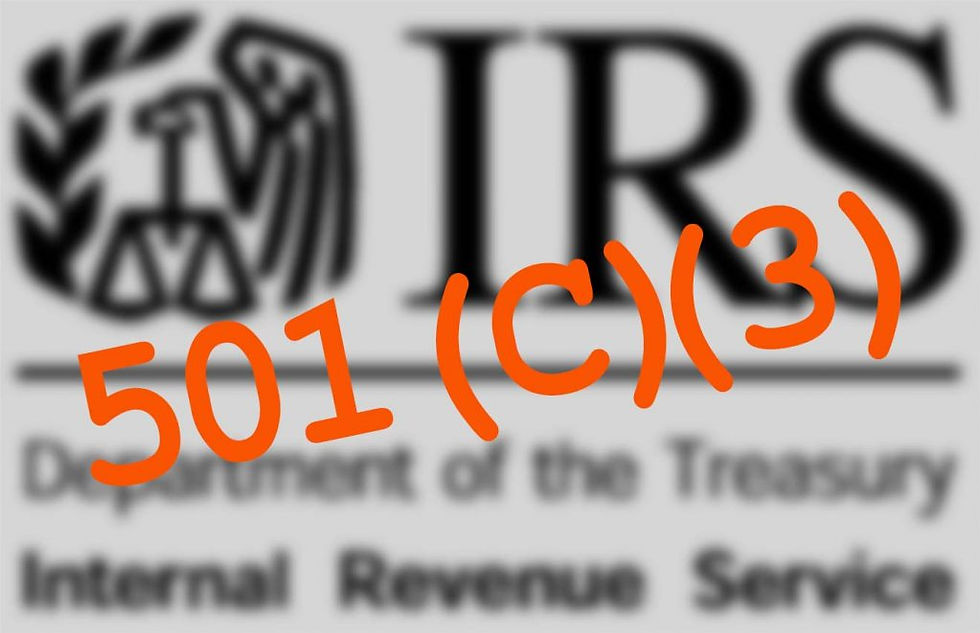Functional quality and role of 501c3 religious organization
- EZ 501c3
- Apr 26, 2023
- 4 min read
A 501c3 religious organization is a type of nonprofit organization that has been recognized by the United States Internal Revenue Service (IRS) as being exempt from federal income tax. This tax-exempt status is granted to organizations that meet certain requirements and are organized and operated exclusively for religious, charitable, scientific, literary, or educational purposes.
To qualify as a 501c3 religious organization, an organization must first meet the definition of a religious organization as defined by the IRS. This definition includes organizations that are primarily engaged in promoting a religious belief, conducting religious services, or providing education or other services that promote a religious faith.

Once an organization meets the definition of a religious organization, it must then apply for tax-exempt status with the IRS. This involves filing an application with the IRS and providing detailed information about the organization's purpose, activities, and finances.
If the application is approved, the organization will be granted tax-exempt status, which means that it will not be required to pay federal income tax on any income it receives. In addition, donors to the organization may be able to claim a tax deduction for their donations.
However, being a 501c3 religious organizations also comes with certain restrictions. For example, the organization must operate exclusively for religious, charitable, scientific, literary, or educational purposes, and cannot engage in any activities that are primarily intended to benefit private individuals or organizations.
In addition, the organization must comply with certain reporting requirements, such as filing an annual Form 990 with the IRS. This form provides detailed information about the organization's finances, including its income, expenses, and assets.
Another important aspect of being a 501c3 religious organization is the ability to receive tax-deductible donations. This means that individuals and businesses who donate to the organization may be able to claim a tax deduction for their contributions, which can be a significant incentive for donors.

Overall, a 501c3 religious organization is a type of nonprofit organization that has been recognized by the IRS as being exempt from federal income tax. This status comes with certain benefits, such as the ability to receive tax-deductible donations, but also comes with certain restrictions and reporting requirements. As such, it is important for organizations to carefully consider whether they meet the requirements for tax-exempt status and to ensure that they comply with all applicable laws and regulations.
A 501(c)(3) religious organization is a non-profit entity that is recognized by the Internal Revenue Service (IRS) as a tax-exempt organization under section 501(c)(3) of the U.S. tax code. These organizations are formed for the purpose of promoting religious worship, education, and charity. They are able to receive tax-deductible donations and are exempt from paying federal income tax.
The role of a 501(c)(3) religious organization is multifaceted and can vary depending on the specific organization and its beliefs. However, there are some common functions and responsibilities that these organizations typically fulfill.
First and foremost, 501(c)(3) religious organizations exist to promote and facilitate religious worship and education. This can take many different forms, depending on the particular religion and denomination. For example, a Christian church might offer regular worship services, Bible studies, youth programs, and other activities designed to deepen members' spiritual knowledge and foster a sense of community. Similarly, a Jewish synagogue might offer regular services, classes on Jewish history and tradition, and social events that bring members together.

In addition to promoting religious worship and education, 501(c)(3) religious organizations also often engage in charitable activities. Many religious groups see it as part of their mission to help those in need and to make a positive impact on their communities. This can involve providing food, shelter, and other assistance to the homeless, supporting disaster relief efforts, and funding programs that provide healthcare, education, and other services to vulnerable populations.
501(c)(3) religious organizations also play an important role in advocating for their members and the broader community. This can involve lobbying for laws and policies that align with the organization's beliefs, as well as speaking out on social and political issues. For example, a Catholic organization might advocate for laws that protect the sanctity of life and the rights of the unborn, while a Muslim organization might work to combat Islamophobia and promote greater understanding and acceptance of Islam in society.
In order to carry out these functions, 501(c)(3) religious organizations typically rely heavily on the support of their members and donors. They may hold fundraising events, solicit donations, and engage in other activities designed to raise funds to support their programs and initiatives. In many cases, these donations are tax-deductible for the donor, which can incentivize individuals and businesses to give generously.
However, as tax-exempt organizations, 501(c)(3) religious organizations are subject to certain restrictions and regulations. For example, they are prohibited from engaging in partisan political activity or endorsing political candidates. They are also required to file annual tax returns and maintain accurate financial records.
In addition, 501(c)(3) religious organizations are subject to certain limitations on their activities. For example, they must primarily serve a religious or charitable purpose, rather than a commercial one. They are also prohibited from engaging in activities that generate excessive income, such as selling goods or services at a profit.
Despite these limitations, 501(c)(3) religious organizations continue to play an important role in American society. They provide a sense of community and support to millions of Americans, and their charitable activities have a significant impact on the lives of those in need. While there may be debate over the exact role these organizations should play in public life, there is no doubt that they are an important part of the fabric of American society.



Comments